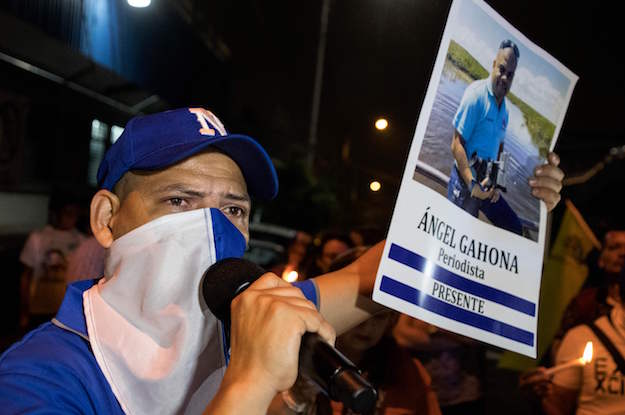The public unrest that began in Nicaragua just over a year ago has subsided, but repression by the government of President Daniel Ortega has not.
When a controversial social security reform sparked wider protests beginning on April 19, 2018, the government response left at least 325 dead and more than 2,000 injured, according to the Inter-American Commission on Human Rights.
Since then, Nicaragua has become a grim example of how quickly press freedom can be eroded, with journalists threatened, criminalized and attacked for doing their jobs. My case is a prime example.
On July 19, while I was covering the anniversary of the Sandinista Revolution in Managua, I was attacked by a pro-government mob. That day I had gone to Plaza de la Fe with a group of foreign journalists, including veteran reporter Jon Lee Anderson, who described what happened in his column in The New Yorker. A member of the ruling Sandinista National Liberation Front (FSLN) recognized me and organized a group of government supporters who grabbed my shirt, threw me to the ground and beat me.
It wasn’t the only time I was harassed. On social media people started accusing me of using my program on Channel 12 to incite protests. They also focused on the fact that I am gay and accused me of assaulting alleged partners; people I didn’t know appeared on social media with injuries that I had supposedly inflicted on them.
Later, paramilitaries followed me on a motorcycle and surrounded my home. At one point I couldn’t leave the house, not even to go the supermarket. One night, while I was having a drink with a friend in my garden, two people with government sources told me I should leave my house that night because officials might be coming for me. That’s how I ended up in exile in Mexico.
My situation could have been much worse. On April 21, 2018, reporter Ángel Gahona was killed in the city of Bluefields, on Nicaragua’s Caribbean coast. That afternoon, Gahona, along with a group of reporters, was covering the demonstrations against Ortega. Gahona, director of the local news program El Meridiano, was livestreaming on Facebook when he was shot.
His killing has still not been solved. The Ortega government has accused two young people who were in the area of the killing, but the reporter’s family says it was not them, demanding that the crime be fully investigated and the real perpetrators brought to justice.
And since Gahona’s death, harassment of journalists working to hold the government to account has continued.
In December, police searched the editorial offices of Confidencial – where I worked as an editor – and the 100% Noticias news channel. The officers, who didn’t have a search warrant, seized all the equipment and took over the offices, which are still under their control. That same night, they detained Miguel Mora, the director of 100% Noticias, and his head of information, Lucía Pineda, supposedly for inciting hatred. Pineda is the only female journalist currently imprisoned in the Americas. The director of Confidencial, Carlos Fernando Chamorro, had to go into exile in Costa Rica.
The situation highlights the importance of protecting reporters from state violence. The international community must demand that our work, which is fundamental to democracy and the rule of law, be respected.
Just as troubling, the crisis facing journalism in Nicaragua is mirrored in several Latin American countries.
According to a report by the organization Article 19, between 2012 and 2018, at least 47 journalists were killed in Mexico while doing their job. In almost all cases, these crimes have gone unpunished.
On March 17, Honduran journalist Gabriel Hernández was killed. His death brings the number of reporters killed in the country in the last three years to at least 30. Honduras ranks 146 out of 180 countries in the Reporters Without Borders 2019 World Press Freedom Index.
In recent years, reporters have also been killed in Brazil and Guatemala, while journalists in Peru, Bolivia, Haiti and Venezuela have been harassed and arbitrarily detained.
The truth cannot be silenced by killing or harassing journalists or forcing them into exile. The Nicaraguan government must investigate the killing of Gahona, return the offices and equipment seized from the press, free Mora and Pineda and allow exiled reporters to return home.
Although Ortega refuses to listen to his people, democratic governments and their citizens can help by exerting international pressure to ensure reporters’ safety. Being a journalist should not be a crime.
—
Salinas Maldonado is a Nicaraguan journalist and the former editor of Confidencial.com.ni. He lives in Mexico City and writes for the Spanish newspaper El País.







